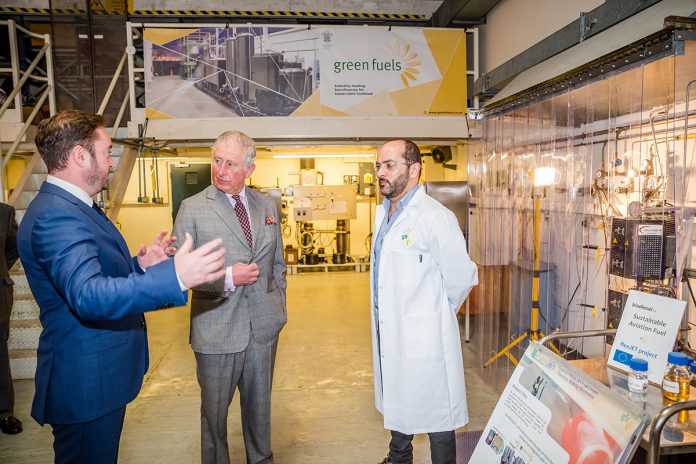
The Horizon 2020 flexJET project, coordinated by the University of Birmingham, will validate a new integrated process to produce sustainable aviation fuel from waste biomass, Dr Miloud Ouadi explains here
On 28 November 2018, the European Commission presented its strategic long-term vision for a prosperous, modern, competitive and climate-neutral economy by 2050, showing that decarbonisation is possible, including the role of the aviation sector where no viable alternative to hydrocarbon fuels exists to date.
The strategy shows how Europe can lead the way to climate neutrality by investing into realistic technological solutions, empowering citizens, and aligning action in key areas such as industrial policy, finance, or research – while ensuring social fairness for a just transition.
From an aviation perspective, the European Union (EU) has invested approximately €5 billion over the last 10 years to support these commitments through various programmes, e.g. Horizon 2020, and a basket of measures, e.g. the Carbon Offsetting and Reduction Scheme for International Aviation (CORSIA).
In 2016, aviation was accountable for 3.6% of the total EU28 greenhouse gas (GHG) emissions and for 13.4% of the emissions from transport, making aviation the second largest source of transport GHG emissions after road traffic. Greenhouse gas emissions from aviation in the EU have more than doubled since 1990 when it accounted for 1.4% of total emissions due to growth in air transport. As emissions from non-transport sources decline, the emissions from aviation become increasingly significant. European aviation represented 20% of global aviation’s CO2 emissions in 2015.
The Commission’s vision for a climate-neutral future covers nearly all EU policies and is in line with the Paris Agreement objective to pursue efforts to keep the global temperature increase to 1.5°C. While this covers all man-made emissions, including aviation, measures to reduce these emissions are covered by the Nationally Determined Contributions under the Paris Agreement as well as global measures developed through the relevant international organisations, such as the International Civil Aviation Organisation (ICAO).
The Renewable Energy Directive (RED) targets do not apply to aviation fuel. However, in 2015, the RED was amended to recognise the possibility of a so-called ‘voluntary aviation opt-in’ to implement in national legislation, which was taken up by the Netherlands and the UK.
Innovative process for aviation biofuel production
The last decade has seen considerable progress in developing Sustainable Aviation Fuels (SAFs) produced from bio-based feedstocks that have lower carbon intensity, and which consequently could play an important role in mitigating the environmental impact of aviation.
flexJET is a four-year project part funded by the European Commission through the Horizon 2020 research initiative. 13 partners from five different European countries are coordinated by the University of Birmingham in UK. As part of Horizon 2020’s new research and innovation programme, it is assisting in the long-term goal of bringing innovative biofuels from sustainable raw materials to the market.
The innovative flexJET project is diversifying the feedstock for sustainable aviation fuel beyond vegetable oils and fats to biocrude oil produced from a wide range of organic waste, diverting it from landfilling or incineration. The process offers better economics and improved overall sustainability by processing waste feedstocks near the source and at a scale that matches the waste availability. This is also one of the first technologies to use green hydrogen from the processed waste feedstock for the downstream refining process thereby maximising greenhouse gas savings and further contributing towards the Paris Agreement GHG reduction goals.
“The main aim of the project is to deliver more than 1,000 tonnes of aviation fuel from sustainable biogenic waste feedstocks. This will mark the first pre-commercial plant for subsequent future deployment”, says Dr Miloud Ouadi from the University of Birmingham.
The project consortium comprises key industrial stakeholders with the knowledge and expertise to develop and implement a full commercial scale technology. “The key industrial partners consist of stakeholders with expertise from across the whole value chain and include feedstock providers such as BIGA, engineering providers such as Green Fuels Research, Susteen Technologies, HyGear Technology and Services, and Fraunhofer Umsicht, and industrial partner for the downstream SAF supply chain and access to the aviation market such as SkyNRG”, says Ouadi. Academia is also heavily involved, with collaborators including the University of Bologna in Italy and the University of Birmingham and the University of Sheffield in the UK. Specific tasks supporting the technology/knowledge transfer and public outreach are being led by LEITAT, ETA-Florence and WRG Europe; project partners with valuable expertise in these fields.
The plant will combine a “Sustainable Aviation through Biofuel Refining” (SABR) process from Green Fuels Research for the refining of biodiesel from organic waste oils with Thermo-Catalytic Reforming (TCR®) technology (an advanced form of pyrolysis) from Susteen Technologies that will produce biocrude oil from waste food and other low-value organic solids. The hydrogen required for the refining steps will be separated from the syngas (an output of the TCR® process) using a decentralised technology from the project partner Hygear.
The size of the commercial plant will be determined by economic data from the project, which will optimise the plant size versus waste collection radius. This means that the commercial-scale facility could be a regional network of local small-scale SABR/TCR® reactors instead of a single large-scale unit. Each plant can be integrated into existing infrastructure.
flexJET project has been presented to HRH the Prince of Wales during his visit to Green Fuels Research laboratories in December 2018. “The Prince was shown the potential impact of SAF in decarbonising aviation and heard how the UK is leading the way in the processing of waste in this game-changing field,” says Dr Sergio Lima, Green Fuels Research’s Senior Research Scientist.
This project has received funding from the EU’s Horizon 2020 Research and Innovation programme under grant agreement No 792216.
Total budget: €15,033,205
EU financing: € 9,999,732,51
H2020- LCE-2017-RES-IA
Duration: 48 months (2018-2022)
References:
https://ec.europa.eu/clima/policies/strategies/2050_en
European Aviation Environmental Report 2019
http://greenfuels.co.uk/blog/2019/01/hrh-the-prince-of-wales-visits-green-fuels-and-gfr/
Dr Miloud Ouadi
Principal Investigator
University of Birmingham
Tel: +44 (0)12141 45294
Please note: This is a commercial profile










